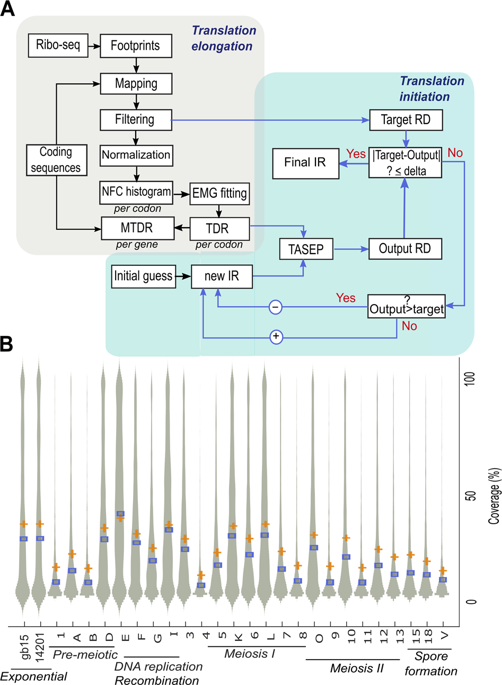当前位置:
X-MOL 学术
›
npj Syst. Biol. Appl.
›
论文详情
Our official English website, www.x-mol.net, welcomes your
feedback! (Note: you will need to create a separate account there.)
Novel insights into gene expression regulation during meiosis revealed by translation elongation dynamics.
npj Systems Biology and Applications ( IF 3.5 ) Pub Date : 2019-04-04 , DOI: 10.1038/s41540-019-0089-0 Renana Sabi 1 , Tamir Tuller 1, 2
npj Systems Biology and Applications ( IF 3.5 ) Pub Date : 2019-04-04 , DOI: 10.1038/s41540-019-0089-0 Renana Sabi 1 , Tamir Tuller 1, 2
Affiliation

|
The ability to dynamically control mRNA translation has a great impact on many intracellular processes. Whereas it is believed that translational control in eukaryotes occurs mainly at initiation, the condition-specific changes at the elongation level and their potential regulatory role remain unclear. Using computational approaches applied to ribosome profiling data, we show that elongation rate is dynamic and can change considerably during the yeast meiosis to facilitate the selective translation of stage-specific transcripts. We observed unique elongation changes during meiosis II, including a global inhibition of translation elongation at the onset of anaphase II accompanied by a sharp shift toward increased elongation for genes required at this meiotic stage. We also show that ribosomal proteins counteract the global decreased elongation by maintaining high initiation rates. Our findings provide new insights into gene expression regulation during meiosis and demonstrate that codon usage evolved, among others, to optimize timely translation.
中文翻译:

翻译延伸动力学揭示了减数分裂过程中基因表达调控的新见解。
动态控制 mRNA 翻译的能力对许多细胞内过程有很大影响。尽管人们认为真核生物中的翻译控制主要发生在起始阶段,但延伸水平上的条件特异性变化及其潜在的调节作用仍不清楚。使用应用于核糖体分析数据的计算方法,我们表明延伸率是动态的,并且在酵母减数分裂期间可以发生很大变化,以促进特定阶段转录本的选择性翻译。我们观察到减数分裂 II 期间独特的伸长变化,包括后期 II 开始时翻译伸长的整体抑制,伴随着减数分裂阶段所需基因伸长的急剧转变。我们还表明,核糖体蛋白通过维持高起始率来抵消整体伸长率的下降。我们的研究结果为减数分裂过程中的基因表达调控提供了新的见解,并证明密码子使用的进化等,以优化及时翻译。
更新日期:2019-04-04
中文翻译:

翻译延伸动力学揭示了减数分裂过程中基因表达调控的新见解。
动态控制 mRNA 翻译的能力对许多细胞内过程有很大影响。尽管人们认为真核生物中的翻译控制主要发生在起始阶段,但延伸水平上的条件特异性变化及其潜在的调节作用仍不清楚。使用应用于核糖体分析数据的计算方法,我们表明延伸率是动态的,并且在酵母减数分裂期间可以发生很大变化,以促进特定阶段转录本的选择性翻译。我们观察到减数分裂 II 期间独特的伸长变化,包括后期 II 开始时翻译伸长的整体抑制,伴随着减数分裂阶段所需基因伸长的急剧转变。我们还表明,核糖体蛋白通过维持高起始率来抵消整体伸长率的下降。我们的研究结果为减数分裂过程中的基因表达调控提供了新的见解,并证明密码子使用的进化等,以优化及时翻译。









































 京公网安备 11010802027423号
京公网安备 11010802027423号